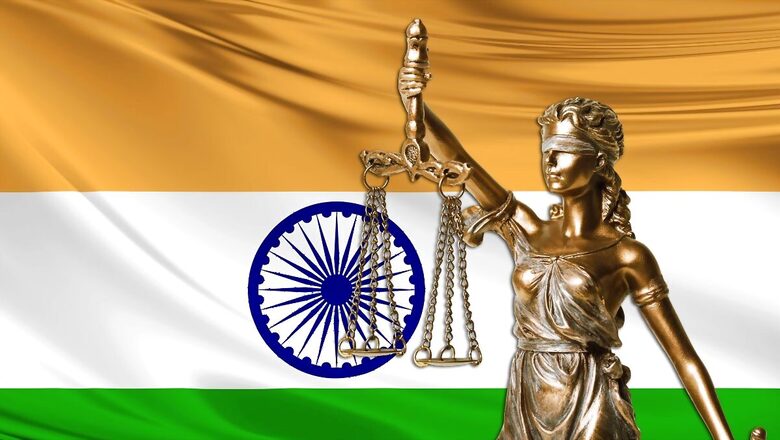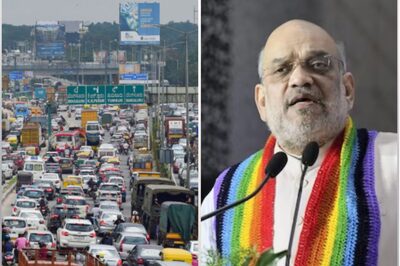
views
With the three new criminal laws coming into effect, a war of words has started between the BJP and the opposition parties with senior Congress leader P Chidambaram slamming the central government over the change. He said it is yet another case of “bulldozing” existing laws and replacing them with three new bills without adequate discussion and debate.
The BJP, meanwhile, hit back quoting Chief Justice of India DY Chandrachud’s views on the new criminal laws, when he said at a conference that the new justice system was a “watershed moment”. Senior party leader Amit Malviya said Justice Chandrachud, at a conference on April 20, said these laws have transitioned India’s legal framework on criminal justice into a new age.
“The status quoist Congress should realise that the newly enacted Bharatiya Nyaya Sanhita, Bharatiya Nagarik Suraksha Sanhita and Bharatiya Saksha Adhiniyam – which seek to replace the colonial era Indian Penal Code (IPC), the Criminal Procedure Code (CrPC) and the Indian Evidence Act, will come into effect, starting 1st July 2024,” Malviya said in a post on X.
Justice Chandrachud, speaking (on 20th April 2024) at a conference on “India’s Progressive Path in the Administration of Criminal Justice System”, described the new criminal justice system as a “watershed moment for our society". He also added that these laws have transitioned… https://t.co/HLJ6MIdfPQ— Amit Malviya (@amitmalviya) July 1, 2024
The Bharatiya Nyaya Sanhita (BNS), Bharatiya Nagarik Suraksha Sanhita (BNSS) and the Bharatiya Sakshya Adhiniyam (BSA) replaced the British-era Indian Penal Code, Code of Criminal Procedure and the Indian Evidence Act.
Chidambaram, however, wrote a lengthy post on social media saying in the long term, further changes must be made to the three laws to bring them in conformity with the Constitution and the modern principles of criminal jurisprudence.
“90-99 per cent of the so-called new laws are a cut, copy and paste job. A task that could have been completed with a few amendments to the existing three laws has been turned into a wasteful exercise. Yes, there are a few improvements in the new laws and we have welcomed them. They could have been introduced as amendments. On the other hand, there are several retrograde provisions. Some changes are prima facie unconstitutional,” he said.
The three criminal laws to replace the IPC, CrPC and Indian Evidence Act come into force today90-99 per cent of the so-called new laws are a cut, copy and paste job. A task that could have been completed with a few amendments to the existing three laws has been turned into a…
— P. Chidambaram (@PChidambaram_IN) July 1, 2024
The former home minister said MPs who were members of the standing committee pored over the provisions and wrote detailed dissent notes to the three bills. He added that the government did not rebut or answer any of the criticisms in the dissent notes and there was no worthwhile debate in Parliament.
“Law scholars, bar associations, judges and lawyers have in numerous articles and seminars pointed out the grave deficiencies in the three new laws. No one in government has cared to answer the questions. It is another case of bulldozing three existing laws and replace them with three new Bills without adequate discussion and debate,” he said.
The initial impact will be to throw the administration of criminal justice into disarray, Chidambaram said. “In the medium term, numerous challenges to the laws will be instituted in various courts. In the long term, further changes must be made to the three laws to bring them in conformity with the Constitution and the modern principles of criminal jurisprudence,” he added.
Union home minister Amit Shah, who piloted the laws, had said the new laws will give priority to providing justice, unlike the British-era laws that gave primacy to penal action. They also take into account some of the current social realities and modern-day crimes.
From Monday, all fresh FIRs will be registered under the BNS. However, cases filed earlier will continue to be tried under the old laws till their final disposals.
The new laws brought in a modern justice system, incorporating provisions such as ‘zero’ FIR, online registration of police complaints, summonses through electronic modes such as SMS and mandatory videography of crime scenes for all heinous crimes. They have tried to address some of the current social realities and crimes, and are going to provide a mechanism to effectively deal with these, keeping in view the ideals enshrined in the Constitution, official sources said.
‘NDA govt establishing repressive police state’
Other opposition leaders like NCP (SP) MP Supriya Sule, AAP leaders Saurabh Bharadwaj and Raghav Chadha, and Congress leader Shashi Tharoor also criticised the new laws, saying there was hardly any discussion or debate before they were enacted.
Sule said the NDA government is establishing a “repressive police state” with the enactment of these new laws. She said they were railroaded in Parliament without any discussion and “unfortunately come into effect posing a significant threat to civil liberties and democratic freedoms”.
“By expanding police authority, extending remand periods, permitting solitary confinement, and diminishing judicial oversight, the NDA government is establishing a repressive police state. The soul of Indian democracy is at stake and we cannot afford to be silent. The 18th Lok Sabha must urgently reconsider these criminal law acts to ensure they align with the principles enshrined in the Constitution,” she said in a post on X.
The recently enacted Criminal Law Bills were railroaded in the Parliament without any discussion, and they unfortunately come into effect today, posing a significant threat to civil liberties and democratic freedoms. By expanding police authority, extending remand periods,…— Supriya Sule (@supriya_sule) July 1, 2024
Bharadwaj said there were no flaws in the previous laws but in their implementation and investigating agencies. He said there will be much confusion for several years, especially for the citizens, leading to “police arbitrariness”.
“…Police don’t take action on those (previous) laws… I think that with the new laws, there will be great confusion for several years to come. A common citizen, who had understood a few laws with great difficulty, will face difficulty in getting their case filed, sections under which the case has to be filed. I think this will lead to police arbitrariness.”
#WATCH | On the new criminal laws, Delhi minister Saurabh Bharadwaj says, "I believe that there was no flaw in the laws. The flaws are in their implementation, in investigating agencies, that Police don't take action on those laws…I think that with the new laws, there will be… pic.twitter.com/kY3NRlZC3b— ANI (@ANI) July 1, 2024
Chadha said the AAP wanted the new laws to be reviewed right from the beginning. “…It should be referred to JPC. It should not be implemented in haste. It will have far-reaching consequences,” he told news agency ANI.
#WATCH | On new criminal laws, AAP MP Raghav Chadha says, "Right from the beginning, AAP is of the opinion that it should be reviewed. It should be referred to JPC. It should not be implemented in haste. It will have far-reaching consequences." pic.twitter.com/tqTaOWa0M4— ANI (@ANI) July 1, 2024
Tharoor, meanwhile, said his major concern is that these laws were not fully discussed before being implemented. “Our concern was that they were not fully discussed in Parliament because all the Opposition was suspended. It would benefit from a further discussion,” he said.
(With PTI inputs)



















Comments
0 comment